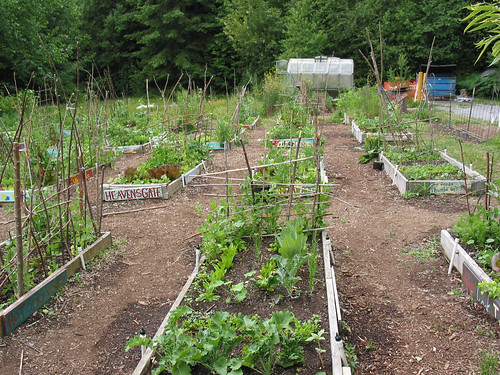I realised when I left Pecha Kucha (at the gorgeously renovated Queen Elizabeth Theatre), in a hurry to catch my 10:20 bus, that I don’t have enough conversations with people about sustainability. I attend events where the hundreds or thousands of people in the room/theatre all have a common interest, yet I go there to absorb information, chat with friends and promptly leave. I can’t blame all of that on living in the suburbs with a typically once-per-half-hour bus. But ultimately the result is that the information I gleaned and my opinions remain for the most part locked in my head and I lose the opportunity to learn from others in my community. (And Vancouver being a small city nurses an intimate though often disconnected one.)
Dialogue takes place frequently online, but in my experience it tends to be short and superficial and, while offering participation theoretically to anyone, the reality is that many voices are left out even within our own city. That’s where dialogue in person can facilitate those deeper connections that might not otherwise be made. It also lets us communicate visually. (And with that, check out RangiChangi Roots.) An event like Pecha Kucha is available to anyone with $10 and a couple hours to spare. It won’t reach everyone, but advertising in offline and particularly free media such as the Georgia Straight (I’m not sure whether it made it to street poles) pushes its reach outside of the—to some degree—exclusive online world. Over 2000 people attended Wednesday’s event, a specially-themed “Walk the Talk, Green Your City”, which is terrifically encouraging.
Continue reading Walk the Talk, Green Your City »
 If you’re reading this you might be as last-minute with your holiday shopping as I tend to be. Admittedly my post itself is last-minute. I’ve done half my shopping and, this year, with each item I’ve put more thought than ever into what effect each will have on this finite planet. If you’re the kind of giver that prefers to give an item rather than an experience, make it meaningful not just as a useful object but as one with the smallest environmental impact possible.
If you’re reading this you might be as last-minute with your holiday shopping as I tend to be. Admittedly my post itself is last-minute. I’ve done half my shopping and, this year, with each item I’ve put more thought than ever into what effect each will have on this finite planet. If you’re the kind of giver that prefers to give an item rather than an experience, make it meaningful not just as a useful object but as one with the smallest environmental impact possible.
Before I tell you how easy it is to be eco-conscious at Christmas, you might want to know why you should:
* according to Statistics Canada, 900,000 tonnes of garbage is produced between Thanksgiving and Christmas each year
* transportion of gifts that are produced a great distance away, whether it’s Califonia or China, emits greenhouse gases that pollute our air and contribute to climate change
* logging of old-growth forests to produce “virgin” paper products releases CO2 into the atmosphere and threatens animal habitat (think of the caribou and the owls!)
* conventional plastic is a petroleum-based product, which carries a triple-threat carbon footprint
* it takes resources and produces waste to make something new and to recycle or dispose of it at the end of its life cycle (which, these days, is often pretty short!)
* that regiftable stuff is better off loved by someone else than being a guilt trip in your closet for you or your kids!
* buying local supports the local economy and friends of your friends
* and more environmental, ethical and health-related reasons…
h3. Ok, I get it. I’ll be good this year. How easy is it?
Got a bookstore nearby? A Choices/Capers/Whole Foods? MEC? Independent coffee shop? Granville Island? Main St or Commercial Drive? You can make smart choices anywhere — that includes IKEA. I did not have to go out of my way to get smart gifts for my family. A bit of thoughtfulness and planning is all it takes. And do I ever feel good about it!
Here are some suggestions and tips!
Continue reading I’m dreaming of a Green Christmas… gift, that is »

I was criticized once by someone who didn’t believe that my choice to not buy broccoli from China and peppers from California in the wintertime would make any difference. I would indeed be acting alone and in vain if everyone lacked faith in the power of the collective. After all, revolutions and rallies are composed of individual people sharing a common purpose. My argument was that if enough of us did not buy Californian peppers in December, it would affect the amount purchased by the store that carried it, impacting up the chain and so forth. It seems like a naive thought but the popularity of eating local has been growing, and with good reason. Eating local and in season offers many benefits including support of small-scale agriculture and healthier, more flavourful food. In terms of climate change, supporting local agriculture and in tandem avoiding foods — especially processed and pre-packaged foods — that have travelled a long distance make a huge impact. Agriculture is as responsible for greenhouse gas emissions as is transportation, based on a system designed around accessing foods year-round and producing these foods in large quantities to be shipped long distances.
Continue reading Start small, dream big for climate change »
Increasingly, the news in the blogs I read has focused on climate change, biofuels and alternative energy for fueling transportation… and with good reason. We’re faced with a crisis, and we all know that. Many of the solutions already exist, in the past before depedence on oil became the norm for most transportation, and gave us solid plastic, plastic bags, chemical fertilizers, fat-free ice cream (propylene glycol, anyone?), and the American Dream: a big house on a big lot in suburbia. Well, Canadians have made that dream as much of a reality as our neighbours to the south, and in greater Vancouver, the hidden evil of it is present in perhaps no stronger a form than in the suburbs of Surrey and Langley.
Continue reading How the oil crisis will change the face of Fraser Highway »

 If you’re reading this you might be as last-minute with your holiday shopping as I tend to be. Admittedly my post itself is last-minute. I’ve done half my shopping and, this year, with each item I’ve put more thought than ever into what effect each will have on this finite planet. If you’re the kind of giver that prefers to give an item rather than an experience, make it meaningful not just as a useful object but as one with the smallest environmental impact possible.
If you’re reading this you might be as last-minute with your holiday shopping as I tend to be. Admittedly my post itself is last-minute. I’ve done half my shopping and, this year, with each item I’ve put more thought than ever into what effect each will have on this finite planet. If you’re the kind of giver that prefers to give an item rather than an experience, make it meaningful not just as a useful object but as one with the smallest environmental impact possible.